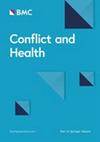哥伦比亚武装冲突的影响:卫生系统的后果、应对措施和挑战
IF 3.1
2区 医学
Q2 PUBLIC, ENVIRONMENTAL & OCCUPATIONAL HEALTH
引用次数: 0
摘要
在哥伦比亚,有关健康与冲突的研究主要集中在心理健康、社会心理护理、流离失所、发病率和死亡率等方面。很少有科学研究对武装冲突期间卫生系统的运作情况进行评估。在以执行与哥伦比亚革命武装力量(FARC)武装团体的和平协议为特点的新时期,了解武装冲突对卫生系统的影响、冲突所形成的功能和机构是了解冲突后卫生政策改革的途径和范围的一个机会。因此,本研究旨在评估武装冲突对卫生系统的影响、应对措施以及在哥伦比亚武装冲突期间为保护医疗任务而建立的机制。本研究采用半结构化访谈和焦点小组讨论的定性方法进行。定性指南分四个部分收集信息:(1) 冲突与卫生系统,提供卫生服务的影响和障碍,(2) 应对这些障碍的行动和协调,(3) 卫生政策与武装冲突,(4) 协议后和当前形势。22 人参加了访谈,包括 8 名国家级决策者和 7 名地方级决策者,其中包括 2 个非政府组织和 5 名国际组织成员。2019 年 12 月举办了一次学术项目活动,并制定了四个重点小组(世界咖啡馆技术),与国家和地方利益攸关方讨论武装冲突对卫生系统的影响,以及分析其后果的分析框架。冲突影响了民众的求医行为,限制了医疗服务的提供,影响了医疗专业人员,并与冲突地区医疗供应不足有关。卫生系统实施了保护医疗任务的机制,对冲突地区的医疗服务进行监管,并承诺为因冲突而流离失所的人口提供医疗服务(精神和身体健康服务)。近年来,国家的存在感、信任度和合法性大大降低。然而,通过确保国家和医疗服务机构在包括偏远地区和农村地区在内的所有领土上的实际存在来恢复这些优势是至关重要的。本文章由计算机程序翻译,如有差异,请以英文原文为准。
Impact of the armed conflict in Colombia: consequences in the health system, response and challenges
In Colombia, research on health and conflict has focused on mental health, psychosocial care, displacement, morbidity, and mortality. Few scientific studies have assessed health system functioning during armed conflicts. In a new period characterized by the implementation of the peace agreement with the Revolutionary Armed Forces of Colombia (FARC) armed group, understanding the effects of armed conflict on the health system, the functions, and institutions shaped by the conflict is an opportunity to understand the pathways and scope of post-conflict health policy reforms. Therefore, this study was conducted to assess the effects of armed conflict on the health system, response, and mechanisms developed to protect medical missions during armed conflict in Colombia. This research was conducted using a qualitative approach with semi-structured interviews and focus group discussions. The qualitative guide collected information in four sections: (1) conflict and health system, effects and barriers in health service provision, (2) actions and coordination to cope with those barriers, (3) health policies and armed conflict, and (4) post-accord and current situation. Twenty-two people participated in the interviews, including eight policymakers at the national level and seven at the local level, including two NGOs and five members of international organizations. An academic project event in December 2019 and four focus groups were developed (World Cafe technique) to discuss with national and local stakeholders the effects of armed conflict on the health system and an analytical framework to analyze its consequences. The conflict affected the health-seeking behavior of the population, limited access to healthcare provision, and affected health professionals, and was associated with inadequate medical supplies in conflict areas. The health system implemented mechanisms to protect the medical mission, regulate healthcare provision in conflict areas, and commit to healthcare provision (mental and physical health services) for the population displaced by conflict. The state’s presence, trust, and legitimacy have significantly reduced in recent years. However, it is crucial to restore them by ensuring that state and health services are physically present in all territories, including remote and rural areas.
求助全文
通过发布文献求助,成功后即可免费获取论文全文。
去求助
来源期刊

Conflict and Health
Medicine-Public Health, Environmental and Occupational Health
CiteScore
6.10
自引率
5.60%
发文量
57
审稿时长
18 weeks
期刊介绍:
Conflict and Health is a highly-accessed, open access journal providing a global platform to disseminate insightful and impactful studies documenting the public health impacts and responses related to armed conflict, humanitarian crises, and forced migration.
 求助内容:
求助内容: 应助结果提醒方式:
应助结果提醒方式:


